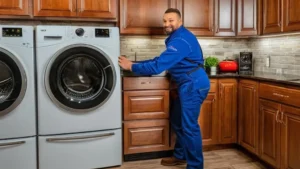Appliance repair refers to the process of fixing or restoring the functionality of household appliances that have malfunctioned or stopped working. This can include a wide range of appliances such as refrigerators, washing machines, dishwashers, ovens, and more. Appliance repair is an essential skill to have as it allows you to save money by avoiding costly replacements and extends the lifespan of your appliances.
Understanding the basics of appliance repair is important because it empowers homeowners to take matters into their own hands and fix minor issues themselves. DIY appliance repair has become increasingly popular in recent years due to the availability of online tutorials and resources. By learning how to repair your own appliances, you can save time and money by avoiding the need to schedule appointments with repair technicians.
Key Takeaways
- Appliance repair involves understanding the basics of common household appliances and their repairs.
- Essential tools and equipment are necessary for DIY appliance repair, but safety guidelines must be followed.
- Troubleshooting techniques can help diagnose and fix electrical issues in appliances.
- Maintaining home appliances can prevent the need for repairs and prolong their lifespan.
- Beginners should start with simple repairs and know when to call a professional for more complex issues.
Common Household Appliances and Their Repairs
There are several common household appliances that are prone to breakdowns and malfunctions. These include refrigerators, washing machines, dishwashers, ovens, microwaves, and more. Each appliance has its own set of common problems and repairs.
For example, refrigerators often experience issues with temperature control, leaks, or strange noises. These problems can be caused by a faulty thermostat, a clogged drain tube, or a malfunctioning compressor. By understanding these common issues, homeowners can troubleshoot and fix them on their own.
Washing machines may encounter problems such as leaks, excessive noise, or failure to start. These issues can be caused by a clogged drain hose, a broken belt, or a faulty motor. By knowing how to identify and fix these problems, homeowners can avoid the need for costly repairs or replacements.
To prevent appliance breakdowns, it is important to perform regular maintenance tasks such as cleaning filters, checking for leaks, and ensuring proper ventilation. Additionally, avoiding overloading appliances and using them according to their intended purpose can help prevent unnecessary wear and tear.
Essential Tools and Equipment for DIY Appliance Repair
Having the right tools and equipment is crucial for successful DIY appliance repair. Some essential tools include a multimeter, screwdrivers, pliers, wrenches, and a socket set. These tools are necessary for tasks such as testing electrical connections, removing screws, and tightening or loosening nuts and bolts.
Investing in high-quality tools is important as they will last longer and provide better results. It is also important to have a variety of sizes and types of tools to accommodate different appliances and repair tasks. For example, having both flathead and Phillips screwdrivers will allow you to work on a wider range of appliances.
When purchasing tools and equipment, it is important to consider your specific needs and budget. Researching different brands and reading reviews can help you make informed decisions. Additionally, consider investing in safety equipment such as gloves, safety glasses, and a fire extinguisher to protect yourself during repairs.
Safety Guidelines for DIY Appliance Repair
Safety should always be a top priority when performing appliance repairs. There are several common safety hazards that homeowners should be aware of when working on appliances.
One of the main safety hazards in appliance repair is the risk of electrical shock. Appliances are powered by electricity, and coming into contact with live wires can be extremely dangerous. It is important to always unplug appliances before working on them and to use a multimeter to test for live wires before touching any electrical components.
Another safety hazard is the risk of burns or cuts from sharp edges or hot surfaces. When working on appliances, it is important to wear protective gloves and avoid touching hot surfaces without proper insulation. Additionally, be cautious when handling sharp tools or parts to avoid cuts or punctures.
To stay safe during appliance repair, it is important to follow safety guidelines and best practices. This includes reading the appliance’s manual for specific safety instructions, working in a well-ventilated area, and avoiding working alone in case of an emergency. If you are unsure about a repair task or feel uncomfortable, it is always best to call a professional.
Troubleshooting Techniques for Appliance Repair
Troubleshooting is an important skill to have when it comes to appliance repair. It involves identifying the cause of a problem and finding a solution. By effectively troubleshooting, homeowners can save time and money by fixing minor issues themselves.
One common troubleshooting technique is to start by identifying the symptoms of the problem. For example, if your refrigerator is not cooling properly, you may notice that the temperature inside is higher than usual or that there is frost buildup. By understanding the symptoms, you can narrow down the possible causes and find a solution.
Another technique is to check for common issues that are easy to fix. For example, if your dishwasher is not draining properly, it could be due to a clogged drain hose or a faulty pump. By checking these common issues first, you may be able to solve the problem without needing to replace any parts.
Effective troubleshooting also involves testing different components and connections. Using a multimeter, you can test electrical connections to ensure they are functioning properly. This can help you identify if a specific component is causing the problem and needs to be replaced.
Tips for Maintaining Your Home Appliances
Regular maintenance is key to keeping your home appliances in good working condition. By following some simple tips, you can extend the lifespan of your appliances and prevent breakdowns.
One important tip is to clean and maintain your appliances regularly. This includes tasks such as cleaning filters, removing lint from dryer vents, and descaling coffee makers. Regular cleaning helps remove dirt and debris that can cause appliances to work harder and wear out faster.
Another tip is to avoid overloading appliances. Overloading can put excessive strain on motors and other components, leading to premature wear and tear. Be sure to follow the manufacturer’s guidelines for load capacity and avoid cramming too many items into appliances such as washing machines or dishwashers.
Additionally, it is important to use appliances according to their intended purpose. For example, using a microwave to heat metal objects can cause sparks and damage the appliance. By using appliances correctly, you can prevent unnecessary damage and ensure they last longer.
How to Diagnose and Fix Electrical Issues in Appliances
Electrical issues are common in appliances and can cause them to malfunction or stop working altogether. Diagnosing and fixing electrical issues requires some basic knowledge and the right tools.
One common electrical issue is a blown fuse or tripped circuit breaker. If an appliance suddenly stops working, it is important to check the fuse box or circuit breaker panel to see if a fuse has blown or a circuit has tripped. If this is the case, simply replacing the fuse or resetting the circuit breaker may solve the problem.
Another electrical issue is a faulty power cord or plug. If an appliance is not turning on at all, it is important to check the power cord and plug for any signs of damage. If there are any frayed wires or loose connections, the power cord may need to be replaced.
If an appliance is experiencing intermittent power issues, it may be due to a faulty electrical connection. Using a multimeter, you can test the continuity of electrical connections to identify any loose or broken wires. If a connection is faulty, it may need to be repaired or replaced.
Replacing Parts: A Step-by-Step Guide to Appliance Repair
Replacing parts is often necessary when repairing appliances. By following a step-by-step guide, homeowners can successfully replace parts and restore the functionality of their appliances.
The first step in replacing parts is to identify the specific part that needs to be replaced. This can be done by troubleshooting the appliance and identifying the cause of the problem. Once the faulty part has been identified, it is important to find a replacement part that is compatible with the appliance.
Next, it is important to gather the necessary tools and equipment for the replacement. This may include screwdrivers, pliers, and a socket set. Having the right tools will make the replacement process easier and more efficient.
Before replacing the part, it is important to unplug the appliance and ensure that it is completely powered off. This will prevent any electrical shocks or accidents during the replacement process. Once the appliance is safely powered off, you can begin removing the old part.
To remove the old part, you may need to unscrew or unclip it from the appliance. It is important to keep track of any screws or clips that are removed so that they can be reattached later. Once the old part is removed, you can then install the new part by following the reverse steps.
After installing the new part, it is important to test the appliance to ensure that it is working properly. If everything is functioning as expected, you can then reassemble any parts that were removed during the replacement process.
Appliance Repair for Beginners: Where to Start
For beginners in appliance repair, it can be overwhelming to know where to start. However, there are some simple repairs that are great for beginners to tackle.
One simple repair that beginners can start with is replacing a refrigerator water filter. This involves removing the old filter and installing a new one. It is a straightforward task that does not require any special tools or technical knowledge.
Another beginner-friendly repair is unclogging a dishwasher drain hose. If your dishwasher is not draining properly, it may be due to a clogged drain hose. By disconnecting the hose and removing any debris, you can restore proper drainage and avoid costly repairs.
For those interested in learning more about appliance repair, there are several resources available. Online tutorials and videos can provide step-by-step instructions for specific repairs. Additionally, there are books and courses available that cover the basics of appliance repair.
When to Call a Professional: Knowing Your Limits in Appliance Repair
While DIY appliance repair can save you time and money, it is important to know your limits and when to call a professional. There are certain situations where it is best to leave the repairs to the experts.
One sign that you should call a professional is if the repair involves complex electrical work. Dealing with live wires and electrical components can be dangerous if you do not have the proper knowledge and experience. In these cases, it is best to hire a licensed electrician or appliance repair technician.
Another sign that you should call a professional is if the repair requires specialized tools or equipment that you do not have access to. Some repairs may require specific diagnostic tools or replacement parts that are not readily available to homeowners. In these cases, it is best to leave the repair to someone who has the necessary resources.
When hiring a professional, it is important to find a reliable and reputable appliance repair service. Ask for recommendations from friends or family members, read online reviews, and check for any certifications or licenses. By doing your research, you can ensure that you are hiring a qualified professional who will provide quality service.
In conclusion, understanding the basics of appliance repair is important for homeowners. By learning how to troubleshoot and fix common issues, homeowners can save time and money by avoiding costly repairs or replacements. However, it is important to know your limits and when to call a professional for more complex repairs. With the right tools, knowledge, and resources, homeowners can successfully maintain and repair their own appliances.
What Are Some DIY Practices for Safely and Effectively Repairing Appliances?
When it comes to effective DIY appliance repair tips, safety is key. Always start by unplugging the appliance and wearing protective gear. Use the appliance manual for guidance and watch online tutorials for step-by-step instructions. If the repair seems too complex, don’t hesitate to call in a professional. Additionally, it’s crucial to stay organized during your repair process. Keep your tools within reach and follow proper appliance tool maintenance tips to ensure longevity and efficiency. Remember, a well-maintained tool can make all the difference in achieving a successful repair.
FAQs
What is appliance repair?
Appliance repair refers to the process of fixing or restoring a malfunctioning household appliance to its original working condition.
What are some common household appliances that require repair?
Common household appliances that require repair include refrigerators, washing machines, dryers, dishwashers, ovens, and microwaves.
What are some effective DIY practices for appliance repair?
Effective DIY practices for appliance repair include checking for power supply issues, cleaning and maintaining the appliance regularly, replacing faulty parts, and consulting the appliance manual or online resources for troubleshooting tips. It’s also important to familiarize yourself with a basic appliance repair tools list, which typically includes screwdrivers, pliers, and a multimeter. Having these tools on hand can greatly enhance your ability to diagnose and fix common issues. Additionally, always prioritize safety by unplugging the appliance before attempting any repairs to avoid electrical hazards. Additionally, it’s helpful to familiarize yourself with common DIY appliance repair techniques to enhance your skills. Engaging in hands-on practice with minor repairs can build your confidence and knowledge over time. Remember, safety should always be your top priority, so ensure the appliance is unplugged before starting any repairs.
What are some safety precautions to take when attempting DIY appliance repair?
Safety precautions to take when attempting DIY appliance repair include unplugging the appliance before starting any repairs, wearing protective gear such as gloves and safety glasses, and avoiding working on the appliance if you are not confident in your abilities.
When should I consider hiring a professional for appliance repair?
You should consider hiring a professional for appliance repair if the issue is beyond your level of expertise, if the appliance is still under warranty, or if attempting DIY repairs could potentially cause further damage or safety hazards. Additionally, professional appliance repair services can save you time and ensure the job is done correctly. Their expertise allows them to quickly diagnose the problem and implement effective solutions without the risk of escalating the damage. Ultimately, investing in professional help can be more cost-effective in the long run, especially when dealing with complex appliances. Moreover, many professional services maintain records of successful appliance repair case studies that highlight their experience and reliability. These case studies can provide valuable insights into common issues and effective repair strategies, giving you confidence in their abilities. When you choose to work with a skilled technician, you’re not just ensuring that the immediate problem is addressed, but also benefiting from their accumulated knowledge in the field.



